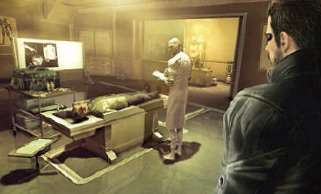Video Games Every Libertarian Should Play

Deus Ex: Deus Ex is a science-fiction role-playing game set against the backdrop of an ongoing debate about the safety and ethics of human augmentation. Players take the guise of Adam Jensen, a corporate security officer tracking anti-biotech militants. The game's cast will be familiar to anyone who has followed similar debates in real life: uncompromising anti-science radicals, moderates who favor regulation, self-interested political players, scheming corporate leaders, and apolitical scientists. The noirish story has no heroes, but it does subtly highlight the value of biological modifications. The key to winning: enhancing Jensen-and yourself.
Fable III: Fable II offered a vast open world in which nearly everything from homes to stores to weaponry was for sale, and violence and other actions impacted local prices, so virtual entrepreneurs could buy low and sell high. Fable III adds politics to the mix. Players are effectively required to campaign for the office of king by making promises to win over the game's citizens. But winning the people doesn't mean winning the game. After assuming the throne, players must either keep those promises-a task that usually turns out to be difficult, if not impossible—or take the game world in a whole new direction, risking the wrath of an unhappy citizenry.
Fallout 3: A post-apocalyptic role-playing game set in a bombed-out, futuristic Washington, D.C., known as the Capitol Wasteland. Warring tribes of wannabe authority figures fight for control, thugs and scammers try to take your guns and your money at every turn, super-intelligent robots try to reengineer society, and the whole place is overrun with mutants. In other words, it's a lot like the Washington, D.C., we all know and love today. Fallout 3 is also one of the most expansive, open, and darkly funny games ever made.

L.A. Noire: L.A. Noire offers a down-to-the-lapels re-creation of Hollywood shortly after World War II. Players take the role of an earnest police investigator moving up the ranks by solving cases. The game's most memorable innovation is the way it handles "interrogations" of suspects. Players must determine, based on the suspect's behavior, whether someone is lying. But unlike most video game challenges, there's no system, no trick, to mastering it. In the end, it's a mix of thorough prior detective work and subconscious intuition; even then, it's easy to be wrong. The subjective nature of the game play highlights the uncertainty of much police work. Sometimes even good players-or cops-make big mistakes.
Papers, Please: Indie game Papers, Please puts players in the role of a customs official in a fictional Eastern European country. Players must analyze the paperwork of each person attempting to pass through a border checkpoint. As the game progresses, the paperwork review process grows more complicated. At first passports are enough, but soon documents like work visas, entry permits, and immunization records also require examination. There are bribes, and special exemptions for diplomats, and wrenching personal stories from potential immigrants. It's all timed. Failure means fines. At the end of each day, players return home to ration the pittance earned on food, rent, heat, and sometimes medicine for the family. Bring home too little, and you'll watch them die off.
Bioshock: Players fight their way through the ruins of an Art Deco underwater city set up as a kind of sci-fi anarchist utopia—where biological modification is plentiful, looters are treated as scum, and the pursuit of individual desire and accomplishment is considered life's most noble goal. The villain is clearly intended as a riff on Ayn Rand's super-individualists, but in a mid-game twist, he shows he's not simply a bad guy. The revelation elevates Bioshock from satirical, action-driven homage to Rand into a clever riff on the perception of individual freedom and the nature of choice.


Show Comments (82)